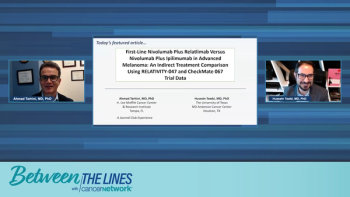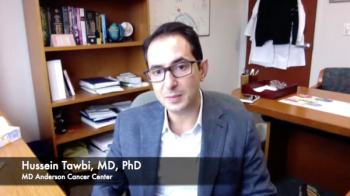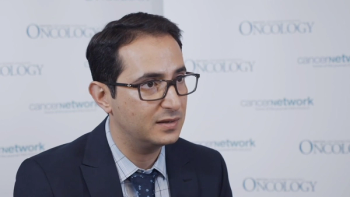Hussein Abdul-Hassan Tawbi, MD, PhD
Articles by Hussein Abdul-Hassan Tawbi, MD, PhD

Immunotherapy for CNS Melanoma: RELATIVITY-020’s Intracranial Efficacy Data
ByMichael A. Postow, MD,Evan J. Lipson, MD,Hussein Abdul-Hassan Tawbi, MD, PhD,Megan Schollenberger, MSN, CRNP,Kathleen Madden, MSN, FNP, AOCNP, APHN,Theresa Rodgers, MPAS, PA-C Panelists discuss evolving treatment strategies for metastatic melanoma with asymptomatic brain metastases, highlighting the superiority of PD-1 plus CTLA-4 combination therapy for durable intracranial responses, while noting that newer immunotherapy combinations like PD-1 plus LAG-3 show promise but require further evidence before altering current standards of care.

Managing Complexity: Care Coordination for CNS Metastases
ByMichael A. Postow, MD,Evan J. Lipson, MD,Hussein Abdul-Hassan Tawbi, MD, PhD,Megan Schollenberger, MSN, CRNP,Kathleen Madden, MSN, FNP, AOCNP, APHN,Theresa Rodgers, MPAS, PA-C Panelists discuss the current standard of care for metastatic melanoma with asymptomatic brain metastases, emphasizing the durability of CTLA-4 plus PD-1 immunotherapy, the emerging but unproven role of newer combinations like PD-1 plus LAG-3, and the importance of multidisciplinary coordination, patient education, and timely intervention in managing both asymptomatic and symptomatic brain involvement.

When Melanoma Spreads to the Brain: Michael’s Story
ByMichael A. Postow, MD,Evan J. Lipson, MD,Hussein Abdul-Hassan Tawbi, MD, PhD,Megan Schollenberger, MSN, CRNP,Kathleen Madden, MSN, FNP, AOCNP, APHN,Theresa Rodgers, MPAS, PA-C This is an actor portrayal of a hypothetical patient profile developed for educational purposes based on characteristics of patients with multiple myeloma as seen in clinical practice. The hypothetical case was co-developed by staff medical writers with Cancer Network/ONN.”

Patient Support Strategies in Metastatic Melanoma: Multidisciplinary Perspectives
ByMichael A. Postow, MD,Evan J. Lipson, MD,Hussein Abdul-Hassan Tawbi, MD, PhD,Megan Schollenberger, MSN, CRNP,Kathleen Madden, MSN, FNP, AOCNP, APHN,Theresa Rodgers, MPAS, PA-C Panelists discuss the importance of patient-centered communication in metastatic melanoma care, emphasizing how clinicians convey the trade-offs between rapid responses from targeted therapies and the durable, immune-driven benefits of immunotherapy, while guiding patients through realistic expectations, personalized goals, and the long-term potential of treatment.

Nivo-Rela vs Nivo-Ipi: What 4-Year ITC and Real-World Data Tell Us About Treatment Selection
ByMichael A. Postow, MD,Evan J. Lipson, MD,Hussein Abdul-Hassan Tawbi, MD, PhD,Megan Schollenberger, MSN, CRNP,Kathleen Madden, MSN, FNP, AOCNP, APHN,Theresa Rodgers, MPAS, PA-C Panelists discuss real-world evidence comparing immunotherapy combinations for metastatic melanoma, highlighting retrospective analyses showing similar efficacy between nivolumab plus relatlimab and nivolumab plus ipilimumab, while emphasizing the relatlimab-based regimen’s lower toxicity and the need for individualized treatment decisions in patients who fall outside typical clinical trial populations.

RELATIVITY-047 at 4 Years: What Long-Term Data Mean for Sarah’s Treatment Options
ByMichael A. Postow, MD,Evan J. Lipson, MD,Hussein Abdul-Hassan Tawbi, MD, PhD,Megan Schollenberger, MSN, CRNP,Kathleen Madden, MSN, FNP, AOCNP, APHN,Theresa Rodgers, MPAS, PA-C Panelists discuss the prioritization of immunotherapy over targeted therapy for BRAF-mutant metastatic melanoma, highlighting updated RELATIVITY-047 data supporting nivolumab plus relatlimab for its durable efficacy and favorable toxicity profile, and emphasizing the importance of individualized treatment selection based on evolving evidence, patient goals, and comparative analyses of combination regimens.

Case Study: Sarah’s Journey With High-Burden BRAF V600E Melanoma
ByMichael A. Postow, MD,Evan J. Lipson, MD,Hussein Abdul-Hassan Tawbi, MD, PhD,Megan Schollenberger, MSN, CRNP,Kathleen Madden, MSN, FNP, AOCNP, APHN,Theresa Rodgers, MPAS, PA-C This is an actor portrayal of a hypothetical patient profile developed for educational purposes based on characteristics of patients with multiple myeloma as seen in clinical practice. The hypothetical case was co-developed by staff medical writers with Cancer Network/ONN.

RELATIVITY-047 4-Year Update: Long-Term Outcomes in Frontline Metastatic Melanoma
ByMichael A. Postow, MD,Evan J. Lipson, MD,Hussein Abdul-Hassan Tawbi, MD, PhD,Megan Schollenberger, MSN, CRNP,Kathleen Madden, MSN, FNP, AOCNP, APHN,Theresa Rodgers, MPAS, PA-C Panelists discuss evolving frontline treatment strategies for metastatic melanoma, emphasizing recent clinical updates—particularly 4-year data from the RELATIVITY-047 trial—and exploring how these findings, including the benefits of nivolumab plus relatlimab, inform real-world decision-making for complex cases like BRAF-mutant disease with high tumor burden.

Panelists discuss how the ITC analysis of first-line dual-IO treatments in advanced melanoma highlights the potential for nivolumab plus relatlimab to offer similar efficacy to nivolumab plus ipilimumab, with a more favorable safety profile, particularly in terms of lower rates of severe immune-related adverse events.

Panelists discuss how first-line targeted therapy for advanced melanoma, particularly BRAF and MEK inhibitors, may offer significant benefits in patients with BRAF-mutant tumors, emphasizing rapid response and the potential for combination with immunotherapy to improve long-term outcomes.

Panelists discuss how using dual immunotherapy regimens for melanoma in real-world practice involves balancing efficacy with safety, patient comorbidities, and treatment accessibility, while also addressing challenges such as immune-related adverse events and treatment sequencing.

Panelists discuss how treating patients with melanoma and brain metastases requires a multidisciplinary approach, emphasizing the role of immunotherapy, targeted therapy, and local treatments, while considering factors like the extent of metastasis and patient-specific factors.

Panelists discuss how dual immunotherapy for melanoma, including combinations like nivolumab plus ipilimumab or nivolumab plus relatlimab, requires careful consideration of sequencing decisions based on factors such as tumor burden, patient health status, and potential toxicity profiles.

Panelists discuss how the indirect treatment comparison of RELATIVITY-047 and CheckMate 067 suggests that nivolumab plus relatlimab may provide similar efficacy to nivolumab plus ipilimumab in advanced melanoma, with a potentially better safety profile.

Panelists discuss how the RELATIVITY-047 trial data highlights the efficacy of nivolumab plus relatlimab in managing advanced melanoma, offering improved progression-free survival with a favorable safety profile compared to with nivolumab alone.

Panelists discuss how treatment decisions in metastatic melanoma involve balancing the benefits of immunotherapy versus targeted therapy, taking into account factors such as tumor genetics, patient response, and tolerability.

Data from the COMBI-AD Trial evaluating dabrafenib and trametinib to treat melanoma was analyzed by Hussein Tawbi, MD, PhD, of The University of Texas MD Anderson Cancer Center.

Cancer Network spoke with Hussein Tawbi, MD, PhD, of MD Anderson Cancer Center, about the efficacy and safety of the combination of nivolumab plus ipilimumab in patients with symptomatic melanoma brain metastases.

Cancer Network spoke with Hussein Abdul-Hassan Tawbi, MD, PhD, on the results of a phase II study of oral azacitidine in combination with pembrolizumab in metastatic melanoma.










